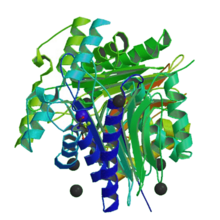Pegaspargase

 | |
| Clinical data | |
|---|---|
| Pronunciation | /pəˈɡæspərɡeɪz/ |
| Trade names | Oncaspar |
| AHFS/Drugs.com | Monograph |
| MedlinePlus | a695031 |
| License data |
|
| Pregnancy category |
|
| Routes of administration | Intramuscular, intravenous |
| ATC code | |
| Legal status | |
| Legal status | |
| Identifiers | |
| |
| CAS Number | |
| DrugBank | |
| ChemSpider |
|
| UNII | |
| KEGG | |
| ChEMBL | |
| Chemical and physical data | |
| Formula | C1377H2208N382O442S17 |
| Molar mass | 31732.06 g·mol−1 |
| | |
Pegaspargase, sold under the brand name Oncaspar, is a medication used in the treatment of acute lymphoblastic leukemia (ALL).[5] Often it is used together with anthracycline, vincristine, and corticosteroids (for example prednisone and dexamethasone).[6] Pegaspargase can be administered either via an intravenous infusion or a intramuscular injection.[6]
Known side effects include allergic reactions, coagulopathy, high blood sugar, affecting liver function, pancreas inflammation, and blood clots in the brain.[6] There is no data regarding the usage of pegaspargase during pregnancy.[7] Therefore, caution should be observed and pegaspargase should only be used during pregnancy when the benefits outweigh the possible risks.
Pegaspargase is a modified version of the enzyme asparaginase which has undergone PEGylation.[8][6] It works by breaking down the amino acid asparagine that are circulating in the bloodstream.[6] The circulating asparagine is essential for the cancer cells to enable growth since they can't produce their own, in contrast to normal cells.[9] The normal cells are therefore less affected by pegaspargase.
Pegaspargase was approved for medical use in the United States in 1994.[6] It is on the World Health Organization's List of Essential Medicines.[10] It is made by Sigma-Tau.[6]
References
[edit]- ^ "Prescription medicines: registration of new chemical entities in Australia, 2017". Therapeutic Goods Administration (TGA). 21 June 2022. Retrieved 9 April 2023.
- ^ "Prescription medicines and biologicals: TGA annual summary 2017". Therapeutic Goods Administration (TGA). 21 June 2022. Retrieved 31 March 2024.
- ^ "Cancer therapies". Health Canada. 8 May 2018. Retrieved 13 April 2024.
- ^ "Oncaspar EPAR". European Medicines Agency (EMA). Retrieved 21 January 2021.
- ^ Graham ML (2003). "Pegaspargase: a review of clinical studies". Adv. Drug Deliv. Rev. 55 (10): 1293–302. doi:10.1016/S0169-409X(03)00110-8. PMID 14499708.
- ^ a b c d e f g "Pegaspargase Monograph for Professionals". Drugs.com. Retrieved 11 October 2019.
- ^ "Pegaspargase (Oncaspar) Use During Pregnancy". Drugs.com. Retrieved 11 October 2019.
- ^ "UNM Cancer Center". Archived from the original on 3 September 2006. Retrieved 28 August 2007.
- ^ "DailyMed - oncaspar- pegaspargase injection, solution for intramuscular and intravenous use". dailymed.nlm.nih.gov. Retrieved 25 September 2022.
- ^ World Health Organization (2019). World Health Organization model list of essential medicines: 21st list 2019. Geneva: World Health Organization. hdl:10665/325771. WHO/MVP/EMP/IAU/2019.06. License: CC BY-NC-SA 3.0 IGO.